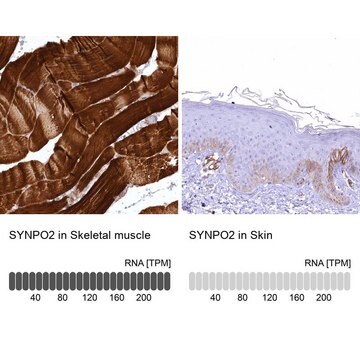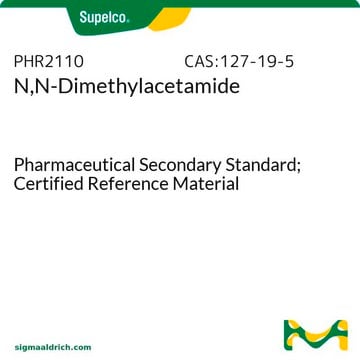About This Item
Recommended Products
vapor density
3 (vs air)
Quality Level
vapor pressure
2 mmHg ( 25 °C)
4 mmHg ( 38 °C)
product line
ReagentPlus®
Assay
99%
form
liquid
autoignition temp.
914 °F
expl. lim.
1.8 %, 100 °F
11.5 %, 160 °F
refractive index
n20/D 1.437 (lit.)
pH
4 (20 °C, 200 g/L)
bp
164.5-166 °C (lit.)
mp
−20 °C (lit.)
density
0.937 g/mL at 25 °C (lit.)
SMILES string
CN(C)C(C)=O
InChI
1S/C4H9NO/c1-4(6)5(2)3/h1-3H3
InChI key
FXHOOIRPVKKKFG-UHFFFAOYSA-N
Looking for similar products? Visit Product Comparison Guide
Related Categories
General description
Application
- Cellulose-HA (hydroxyapatite) nanocomposites using microcrystalline cellulose, CaCl2, and NaH2PO4.
- 5-hydroxymethylfurfural (HMF) from various carbohydrates and natural biopolymer lignocellulose in the presence of LiCl.
It can also be used:
- In the Pd-catalyzed regioselective synthesis of ketones from olefins using molecular oxygen.
- As a solvent as well as a methylene source in the regioselective linkage of two imidazo[1,2-a] pyridines using Cu(OAc)2 catalyst.
Features and Benefits
- High dissolution power of various substrate.
- High capacity to solvate anions.
Legal Information
Signal Word
Danger
Hazard Statements
Precautionary Statements
Hazard Classifications
Acute Tox. 4 Dermal - Acute Tox. 4 Inhalation - Eye Irrit. 2 - Repr. 1B
Storage Class Code
6.1C - Combustible acute toxic Cat.3 / toxic compounds or compounds which causing chronic effects
WGK
WGK 2
Flash Point(F)
147.2 °F - closed cup
Flash Point(C)
64 °C - closed cup
Certificates of Analysis (COA)
Search for Certificates of Analysis (COA) by entering the products Lot/Batch Number. Lot and Batch Numbers can be found on a product’s label following the words ‘Lot’ or ‘Batch’.
Already Own This Product?
Find documentation for the products that you have recently purchased in the Document Library.
Customers Also Viewed
Our team of scientists has experience in all areas of research including Life Science, Material Science, Chemical Synthesis, Chromatography, Analytical and many others.
Contact Technical Service













